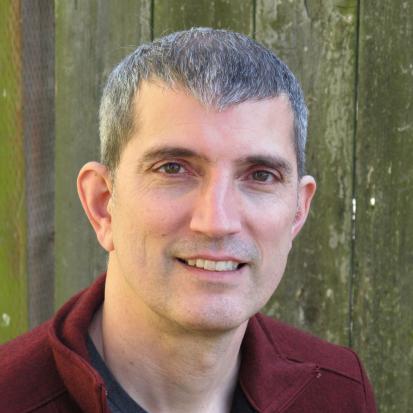
As art director Rudolph Sternad said in 1952, making movies on sound stages and backlots was “90 percent physical.” For that reason, Tweedie reframes the history of Hollywood cinema by foregrounding the role of design and fabrication in the studio system, the factory that conjured up and engineered dream after dream.
Photo: Portrait of James Tweedie. Photo Credit: Sasha Welland
James Tweedie (Professor, Cinema & Media Studies) has received a Guggenheim Fellowship for his work on artificial settings designed and constructed in the classical Hollywood studios. Tweedie is the author of Moving Pictures, Still Lives: Film, New Media, and the Late Twentieth Century (Oxford, 2018) and The Age of New Waves: Art Cinema and the Staging of Globalization (Oxford, 2013), which received the Katherine Singer Kovács Book Award from the Society for Cinema and Media Studies.
In Tweedie's research and writing he explores the relationship between cinematic images and the material world. His current project focuses on the artificial settings designed and constructed in the classical Hollywood studios. As art director Rudolph Sternad said in 1952, making movies on sound stages and backlots was “90 percent physical.” For that reason, Tweedie reframes the history of Hollywood cinema by foregrounding the role of design and fabrication in the studio system, the factory that conjured up and engineered dream after dream.
Tweedie launched this project while studying design with the support of a New Directions Fellowship from the Andrew W. Mellon Foundation, and conducted archival research on studio art departments with a grant from the Academy Film Scholars program at the Academy of Motion Picture Arts and Sciences. Read more about the project and award announcement on the Guggenheim “Fellow Spotlight” page.
Tweedie has been part of the Simpson Center in a variety of roles: he was an organizer of the Moving Images Research Group (MIRG), a former member of the Simpson Center Executive Board, and a 2011-2012 fellow of the Society of Scholars. Learn more about Tweedie at Cinema & Media Studies.
James Tweedie (Professor, Cinema & Media Studies) has received a Guggenheim Fellowship for his work on artificial settings designed and constructed in the classical Hollywood studios. Tweedie is the author of Moving Pictures, Still Lives: Film, New Media, and the Late Twentieth Century (Oxford, 2018) and The Age of New Waves: Art Cinema and the Staging of Globalization (Oxford, 2013), which received the Katherine Singer Kovács Book Award from the Society for Cinema and Media Studies.
In Tweedie's research and writing he explores the relationship between cinematic images and the material world. His current project focuses on the artificial settings designed and constructed in the classical Hollywood studios. As art director Rudolph Sternad said in 1952, making movies on sound stages and backlots was “90 percent physical.” For that reason, Tweedie reframes the history of Hollywood cinema by foregrounding the role of design and fabrication in the studio system, the factory that conjured up and engineered dream after dream.
Tweedie launched this project while studying design with the support of a New Directions Fellowship from the Andrew W. Mellon Foundation, and conducted archival research on studio art departments with a grant from the Academy Film Scholars program at the Academy of Motion Picture Arts and Sciences. Read more about the project and award announcement on the Guggenheim “Fellow Spotlight” page.
Tweedie has been part of the Simpson Center in a variety of roles: he was an organizer of the Moving Images Research Group (MIRG), a former member of the Simpson Center Executive Board, and a 2011-2012 fellow of the Society of Scholars. Learn more about Tweedie at Cinema & Media Studies.